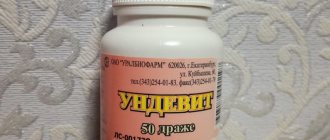Flu-like symptoms
Taking more zinc than the prescribed UL may cause flu-like symptoms such as fever, chills, cough, headache and fatigue ().
These symptoms occur in many conditions, including poisoning from other minerals. Therefore, diagnosing zinc overdose can be difficult.
Your doctor may need your detailed medical and dietary history, as well as blood tests to suspect mineral poisoning.
If you are taking supplements, be sure to tell your doctor.
Summary:
Flu-like symptoms can occur due to excess intake of several minerals, including zinc. Therefore, to ensure proper treatment, it is important to report all supplements you are taking to your healthcare provider.
Reducing levels of “good” HDL cholesterol
"Good" HDL cholesterol reduces your risk of heart disease by removing cholesterol from your cells, thereby preventing the formation of artery-clogging cholesterol plaques.
For adults, health authorities recommend that HDL cholesterol levels be above 40 mg/dL. Low levels increase the risk of developing cardiovascular disease.
A review of several studies on zinc and cholesterol levels suggests that supplementing with more than 50 mg of zinc per day may lower your levels of “good” HDL cholesterol and have no effect on your “bad” LDL cholesterol (, , ).
The review also found that doses of 30 mg of zinc per day—lower than the zinc TDL—had no effect on HDL cholesterol when taken for up to 14 weeks ().
Although several factors influence cholesterol levels, these findings should be considered if you regularly take zinc supplements.
Summary:
Regularly consuming more than recommended levels of zinc can cause your levels of “good” HDL cholesterol to fall, which can increase your risk of developing heart disease.
Nausea and vomiting
Nausea and vomiting are usually side effects of zinc poisoning.
A review of 17 studies on the effectiveness of zinc supplements for treating colds found that zinc may shorten the duration of colds, but side effects were common. In fact, 46% of study participants reported nausea ().
Doses greater than 225 mg are emetic—meaning that vomiting is likely and can occur quickly. In one case, severe nausea and vomiting began 30 minutes after a single dose of 570 mg of zinc (,).
However, vomiting may occur at lower doses. In one six-week study, more than half of 47 healthy people who took 150 mg of zinc per day experienced nausea and vomiting ().
Although vomiting may help the body rid itself of toxic amounts of zinc, it may not be enough to prevent further complications.
If you have consumed toxic amounts of zinc, seek medical attention immediately.
Summary:
Nausea and vomiting are common and often immediate symptoms of zinc overdose.
Why is zinc so important for the body?
Zinc has universal significance for the human body. It makes your appearance more attractive and strengthens all body functions. Its meaning should be described in detail.
This element has the following effects:
- Leads to improved metabolism. Normalizes metabolism.
- Strengthens immunity. Increases the abilities of antibodies and leukocytes. The microelement is so useful that it prevents the virus from passing into the cells of the human body.
- Helps the child grow. Promotes cell division.
- Positively affects the reproductive organs. Promotes the formation of active sperm. Prevents prostate adenoma. It improves hormonal status in women, so women need it just as much as men.
- Reduces the likelihood of cancer. Rids the body of unnecessary and toxic elements.
- Helps slow down the aging process. Eliminates free radicals.
- Improves the health of nails, skin and hair. Rejuvenates the skin.
- Strengthens bone tissue.
- Prevents myopia and makes eyes adaptable to darkness.
So, the element in question is indispensable in the fight against aging, improving metabolism, immunizing the body and other important processes.
Abdominal pain and diarrhea
Typically, abdominal pain and diarrhea occur in combination with nausea and vomiting.
In one review of 17 studies on zinc supplements and the common cold, approximately 40% of participants reported abdominal pain and diarrhea ().
In more severe cases, a person may experience intestinal irritation and gastrointestinal bleeding.
In one case study, a person experienced intestinal bleeding after taking 220 mg of zinc sulfate twice daily to treat acne ().
In addition, zinc chloride concentrations exceeding 20% are known to cause significant corrosive damage to the gastrointestinal tract (,).
Zinc chloride is not used in dietary supplements, but poisoning can occur due to accidental ingestion of household products. Adhesives, sealants, soldering fluxes, cleaning chemicals and wood finishing products contain zinc chloride.
Summary:
Abdominal pain and diarrhea are common symptoms of zinc overdose. In some cases, severe gastrointestinal damage and bleeding may occur.
Treatment Options
If you think you may be experiencing symptoms and signs of zinc overdose, contact your local poison control center immediately.
Zinc poisoning is potentially life-threatening. Therefore, it is important to seek medical help immediately.
You may be advised to drink milk as its high levels of calcium and phosphorus can help suppress the absorption of zinc in the gastrointestinal tract. Activated carbon has a similar effect ().
In cases of severe poisoning, chelating agents have also been used. They help rid the body of excess zinc by binding to it in the blood. It is then excreted in your urine rather than being absorbed into your cells.
Summary:
Zinc overdose is a potentially life-threatening condition. It is important to seek medical help immediately.
Copper deficiency
Zinc and copper compete for absorption in the small intestine.
Doses of zinc above the ULLA may affect your body's ability to absorb copper. Over time, this can cause copper deficiency ().
Like zinc, copper is an important mineral. It promotes the absorption and metabolism of iron, making it essential for the formation of red blood cells. It also plays a role in the formation of white blood cells ().
Red blood cells transport oxygen in your body, while white blood cells play a key role in your immune function.
Zinc-induced copper deficiency is associated with several blood disorders (, , ):
- Iron deficiency anemia : A lack of healthy red blood cells due to insufficient iron in the body.
- Sideroblastic anemia : A lack of healthy red blood cells due to an inability to properly absorb iron.
- Neutropenia : Lack of healthy white blood cells due to impaired production.
If you have a copper deficiency, do not mix copper supplements with zinc supplements.
Summary:
Regular doses of zinc above 40 mg per day may interfere with copper absorption. This can lead to copper deficiency, which is associated with several blood diseases.




![Selenium [converted]-04-1.jpg](https://laram-halal.ru/wp-content/uploads/selen-preobrazovannyj-04-1-jpg-330x140.jpg)



